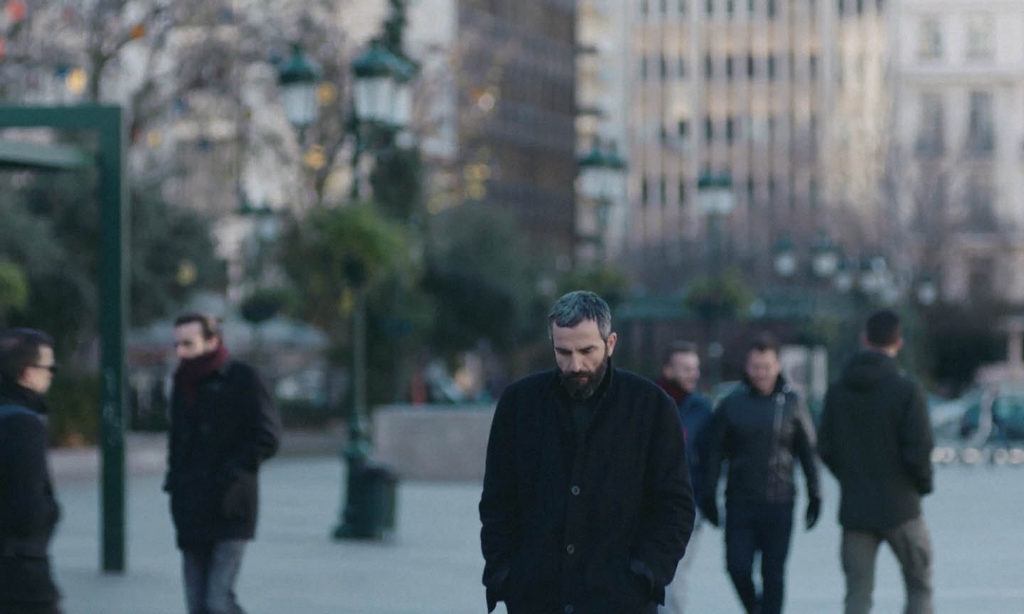Apples (Mila)

Aris Servetalis in Christos Nikou's APPLES. Image courtesy TIFF.
“Love is something far more than desire for sexual intercourse; it is the principal means of escape from the loneliness which afflicts most men and women throughout the greater part of their lives.”
-Bertrand Russell
A man (Aris Servetalis) leaves an apartment, we’re shown in a sequence of shots: a bed, a closet, a nightgown. After banging his head against the wall, he hears about a new medical program. A pandemic has struck the people of Greece (and possibly the world), causing memory loss. The “New Identity” program at the local hospital under the Disturbed Memory Department, run by two doctors, a middle-aged woman and an older man, seeks to rehabilitate the afflicted.
Our thin, bearded protagonist walks around the corner with a small bouquet, and passes a dog named Malou. He boards a city bus, and falls asleep. Upon waking, he doesn’t remember his stop, much less his identity. He’s taken to a hospital and given a meal, from which he offers an apple to the man in the other bed who was found in a football field. The man refuses, “I don’t remember if I like them.”
Those unclaimed by family cannot stay in hospital care indefinitely. So as part of the New Identity program, doctors set them up in apartments and deliver a series of cassettes with instructions to try to socialize them back into the world. We quickly discover that the instructions are all the same and, if we’re American, our gears start turning. But this isn’t necessarily that kind of film. There isn’t some vast government conspiracy, e.g. some military program to experiment on unwitting human beings.
As he re-enters the world, following the tapes’ instructions—catching a movie, having a drink at a club, riding bicycle (“No one forgets how to ride a bike,” says the doctor), trying to pick up a woman (which he does), doing The Twist—none of this seems to hold his interest for any length of time. We begin to think he’s suffering from depression, and he is. But not for the reasons we think.
His debut film in the Greek Weird Wave, writer/director Christos Nikou uses craft and character in a timely examination of solitude. Nikos employs a square frame aspect on the one hand to represent, I suppose, the confined space of the man’s memory. But then this also shows us the narrowed frame of his life. Remember those opening images? The color yellow features prominently, leveraging perhaps the city’s abundance of sodium vapor streetlights. We see it repeatedly when our friend feels like he can’t—or perhaps refuses to—connect with others, and instead chooses to wallow in a depressive funk. It’s the color of the flowers he carries. He even asks for “yellow sauce” when he can’t remember the word for “mustard”. And, perhaps most obviously, it’s the inside of apples which are said—as the grocer in his temporary neighborhood reminds him—to improve memory.
Servetalis never overplays his hand, so to speak. He doesn’t spring into paroxysms. His character remains cloistered, withdrawn into himself. On rare occasion, he loosens up, as when he hits the dance floor. But watch his body language. As he wrests himself from the column he’s leaning into, we can feel his joints and ligaments unclench. In 2020, the longest year of our lives, we’ve all had our fair share of weekends pulling the covers up and going back to bed to deal with the world another day. When we finally work up the motivation, it takes some time to recover from the atrophy.
Is being alone without even our own thoughts/memories truly isolating, or is it freeing? What if you were plagued with the memory of the loss of a loved one? Michel Gondry experimented with these notions of connection and disconnection in ETERNAL SUNSHINE OF THE SPOTLESS MIND, albeit from a different angle—individual agency. In this case, our man meets an amnesiac (Sofia Georgovasili), and they form a kind of fleeting relationship. They find a car they think is hers, drive through the countryside, crash into a tree and take polaroids. That may seem like an unusual date but, in our current, real-world pandemic, one cannot overstate the appeal. Alas, even her agreement to that last drink and subsequent sexual advances can’t lure his mind away from wherever it’s been. Unlike Joel (Jim Carrey) in Gondry’s film, our man is anything but transfixed on her.
Let’s play a quick game. Without looking at the beginning of this review, do you remember the dog’s name? He does.